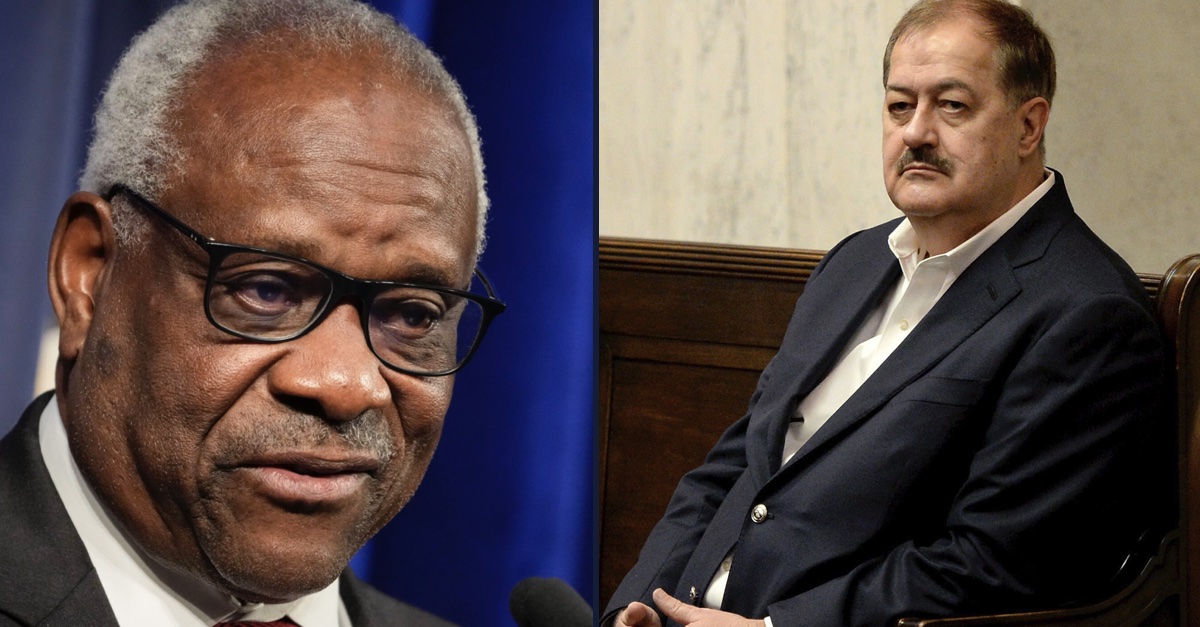
Justice Clarence Thomas (Photo by Drew Angerer/Getty Images), Don Blankenship listens to arguments in the West Virginia Supreme Court in Charleston, W.Va., Aug. 29, 2018. (Chris Dorst/Charleston Gazette-Mail via AP, File)
Supreme Court Justice Clarence Thomas on Tuesday agreed with denying a case brought by former West Virginia coal executive Don Blankenship while also agreeing that the days of the landmark defamation law precedent New York Times Co. v. Sullivan should be numbered.
In Times v. Sullivan, which was decided in 1964, the Supreme Court held that a “State cannot, under the First and Fourteenth Amendments, award damages to a public official for defamatory falsehood relating to his official conduct unless he proves ‘actual malice’ — that the statement was made with knowledge of its falsity or with reckless disregard of whether it was true or false.”
When Don Blankenship filed his petition for a writ of certiorari in the Supreme Court in May, he asked the justices to answer two questions:
(1) whether the actual malice standard imposed on public figure plaintiffs in defamation cases should be replaced; and (2) whether the framework for summary judgment in public figure defamation cases should be reformed.
In the petition challenging the U.S. Court of Appeals for the Fourth Circuit’s February ruling affirming the dismissal of his lawsuit against multiple major media outlets, Blankenship asserted that the actual malice standard established by Times v. Sullivan “poses a clear and present danger to our democracy.”
The former Constitution Party candidate named NBCUniversal, Fox News, CNN, The Washington Post, Law&Crime’s sister site Mediaite, Roll Call, The Charleston Gazette-Mail, and the Boston Globe as parties to the proceeding.
In particular, Blankenship claimed that his candidacy was derailed by the falsehood that he was a “convicted felon.”
“Petitioner has never been convicted of a felony. The damage was irreparable,” Blankenship’s petition said, noting that he was instead convicted of a misdemeanor in connection with a 2010 mine explosion that left 29 dead in West Virginia.
Read Related Also: The Untold Truth Of The Oslo Accords
Blankenship’s petition asserted that the press should not be free to publish falsehoods like this and destroy a candidate’s campaign.
“A representative government cannot be sustained unless the electorate receives accurate information about election candidates and retains confidence in election fairness. New York Times Co. v. Sullivan, 376 U.S. 254 (1964) and its progeny grant the press a license to publish defamatory falsehoods that misinform voters, manipulate elections, intensify polarization, and incite unrest,” the petition said. “Election disinformation undermines our nation’s capacity for genuine self-government.”
While concurring in the denial of certiorari on Tuesday, Justice Thomas said he nonetheless continues to “adhere to my view that we should reconsider the actual-malice standard.”
“The Court usurped control over libel law and imposed its own elevated standard in New York Times Co. v. Sullivan, 376 U. S. 254 (1964). It decreed that the Constitution required ‘a federal rule that prohibits a public official from recovering damages for a defamatory falsehood relating to his official conduct unless he proves that the statement was made with ‘actual malice’—that is, with knowledge that it was false or with reckless disregard of whether it was false or not,”” Thomas wrote. “The Court did not base this ‘actual malice’ rule in the original meaning of the First Amendment.”
As Thomas indicated, it wasn’t the first and seemingly won’t be the last time the conservative justice has called on the court to “reconsider” Times v. Sullivan.
Thomas just didn’t view Blankenship’s case as the right one to achieve that end.
“Petitioner Don Blankenship asks us to revisit New York Times. I agree with the Court’s decision not to take up that question in this case because it appears that Blankenship’s claims are independently subject to an actual-malice standard as a matter of state law,” Thomas noted. “In an appropriate case, however, we should reconsider New York Times and our other decisions displacing state defamation law.”
Have a tip we should know? [email protected]








